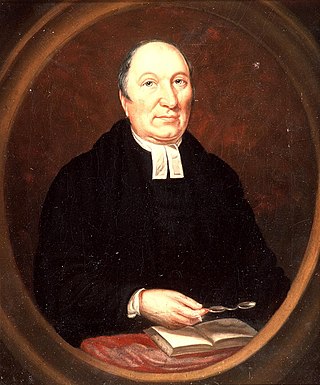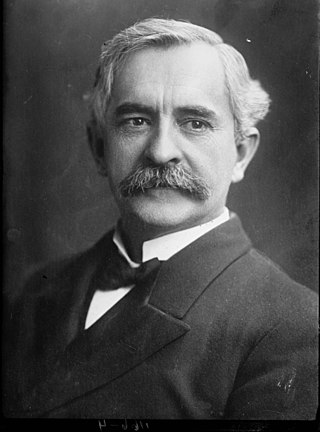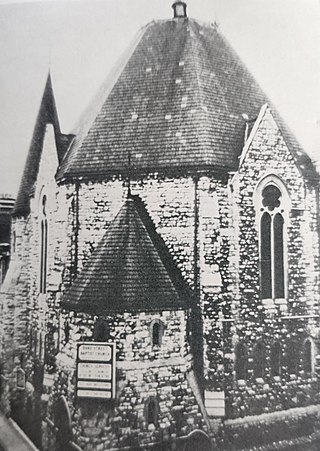Related Research Articles

Dwight Lyman Moody, also known as D. L. Moody, was an American evangelist and publisher connected with Keswickianism, who founded the Moody Church, Northfield School and Mount Hermon School in Massachusetts, Moody Bible Institute and Moody Publishers. One of his most famous quotes was "Faith makes all things possible... Love makes all things easy." Moody gave up his lucrative boot and shoe business to devote his life to revivalism, working first in the Civil War with Union troops through YMCA in the United States Christian Commission. In Chicago, he built one of the major evangelical centers in the nation, which is still active. Working with singer Ira Sankey, he toured the country and the British Isles, drawing large crowds with a dynamic speaking style.

Charles Haddon Spurgeon was an English Particular Baptist preacher.

Reformed Baptists are Baptists that hold to a Calvinist soteriology (salvation). The first Calvinistic Baptist church was formed in the 1630s. The 1689 Baptist Confession of Faith was written along Calvinistic Baptist lines. The name “Reformed Baptist” dates from the latter part of the 20th Century to denote Baptists who have adopted elements of Reformed theology, but retained Baptist ecclesiology.
The Baptist Churches of New Zealand is a Baptist Christian denomination in New Zealand. It is affiliated with the Baptist World Alliance. The headquarters is in Auckland.

The Metropolitan Tabernacle is a large independent Reformed Baptist church in the Elephant and Castle in London. It was the largest non-conformist church of its day in 1861. The Tabernacle Fellowship have been worshipping together since 1650. Its first pastor was William Rider; other notable pastors and preachers include Benjamin Keach, John Gill, John Rippon and C. H. Spurgeon. The Tabernacle still worships and holds to its Biblical foundations and principles under its present pastor, Peter Masters.
John Kitto was an English biblical scholar of Cornish descent.

John Angell James, was an English Nonconformist clergyman and writer.

Thomas Charles was a Welsh Calvinistic Methodist clergyman of considerable importance in the history of modern Wales.

Ragged schools were charitable organisations dedicated to the free education of destitute children in 19th century Britain. The schools were developed in working-class districts and intended for society's most destitute youngsters who, it was argued, were often excluded from Sunday School education because of their unkempt appearance and often challenging behaviour. After a few of such schools were set up in the early 19th century by individual reformers, the London Ragged School Union was established in April 1844 to combine resources in the city, providing free education, food, clothing, lodging and other home missionary services for poor children. Although the Union did not extend beyond London, its publications and pamphlets helped spread ragged school ideals across the country before they were phased out by the final decades of the 19th century.

Arthur Tappan Pierson was an American Presbyterian pastor, Christian leader, missionary and writer who preached over 13,000 sermons, wrote over fifty books, and gave Bible lectures as part of a transatlantic preaching ministry that made him famous in Scotland, England, and Korea. He was a consulting editor for the original "Scofield Reference Bible" (1909) for his friend, C. I. Scofield and was also a friend of D. L. Moody, George Müller, Adoniram Judson Gordon, and C. H. Spurgeon, whom he succeeded in the pulpit of the Metropolitan Tabernacle, London, from 1891 to 1893. Throughout his career, Pierson filled several pulpit positions around the world as an urban pastor who cared passionately for the poor.

Amzi Clarence Dixon was a Baptist pastor, Bible expositor, and evangelist who was popular during the late 19th and the early 20th centuries. With R.A. Torrey, he edited an influential series of essays, published as The Fundamentals (1910–15), which gave Christian fundamentalism its name.

Duke Street Church is an FIEC-affiliated conservative evangelical church in Duke Street, Richmond, South West London with a historical baptist tradition. Efforts from 1868 by a student pastor Frederick Brotherton Meyer started to gain traction*, and in 1869 he wrote to the Charles Spurgeon, then President of the London Baptist Association asking for his help to establish something more permanent.

Central Oak Heights is an association of cottage owners on 45 acres (0.22 km2) of wooded land in Kelly Township, Union County, Pennsylvania in the United States. It was founded in 1909 as a religious campground and retreat by the Bible Conference Society of Central Pennsylvania of the United Evangelical Church.
The Fundamentals: A Testimony To The Truth is a set of ninety essays published between 1910 and 1915 by the Testimony Publishing Company of Chicago. It was initially published quarterly in twelve volumes, then republished in 1917 by the Bible Institute of Los Angeles as a four-volume set. Baker Books reprinted all four volumes under two covers in 2003.
Richard Barcham Shalders (1824–1914) was a Baptist preacher, founder of the New Zealand branch of the YMCA, and founder of Auckland Baptist Tabernacle.

Archibald Geikie Brown was a Calvinistic Baptist minister; a student, friend, and associate of Charles Spurgeon; and from 1908 to 1911, pastor of the Metropolitan Tabernacle in London, the church earlier pastored by Spurgeon.
Peter Masters has been the Minister of the Metropolitan Tabernacle (Spurgeon's) in central London since 1970. He started the Evangelical Times, an evangelical conservative newspaper. He directs the School of Theology, an annual conference for pastors and Christian workers.
Edward Joshua Poole-Connor was an evangelical preacher and Christian leader whose ministry spanned a most turbulent period in British church life, from the time of Charles Spurgeon to the 1960s, and whose record and analysis of its events has been widely observed.

Edward Steane (1798–1882) was a British Baptist minister who founded the Evangelical Alliance. He was pastor in Camberwell.
References
- 1 2 3 Sloan 1910, p. 3.
- ↑ Sloan 1910, p. 64.
- ↑ Sloan 1910, p. 13.
- ↑ Sloan 1910, p. 32.
- ↑ "Mr. Charles Waters". The Times . No. 39164. 8 January 1910. p. 11. Retrieved 28 April 2023.
- ↑ Historic England. "Monument to Charles Waters, Camberwell Old Cemetery (1385530)". National Heritage List for England . Retrieved 28 April 2023.
- ↑ Sloan 1910, p. 105.
- ↑ Robert Latimer Sloan (1910). Charles Waters: The Founder of the International Bible Reading Association. Sunday School Union. p. 103.
- ↑ Sloan 1910, p. 14.
- ↑ Sloan 1910, p. 16.
- Sloan, Robert Latimer (1910). Charles Waters: The founder of the International Bible Reading Association. London: Sunday School Union.